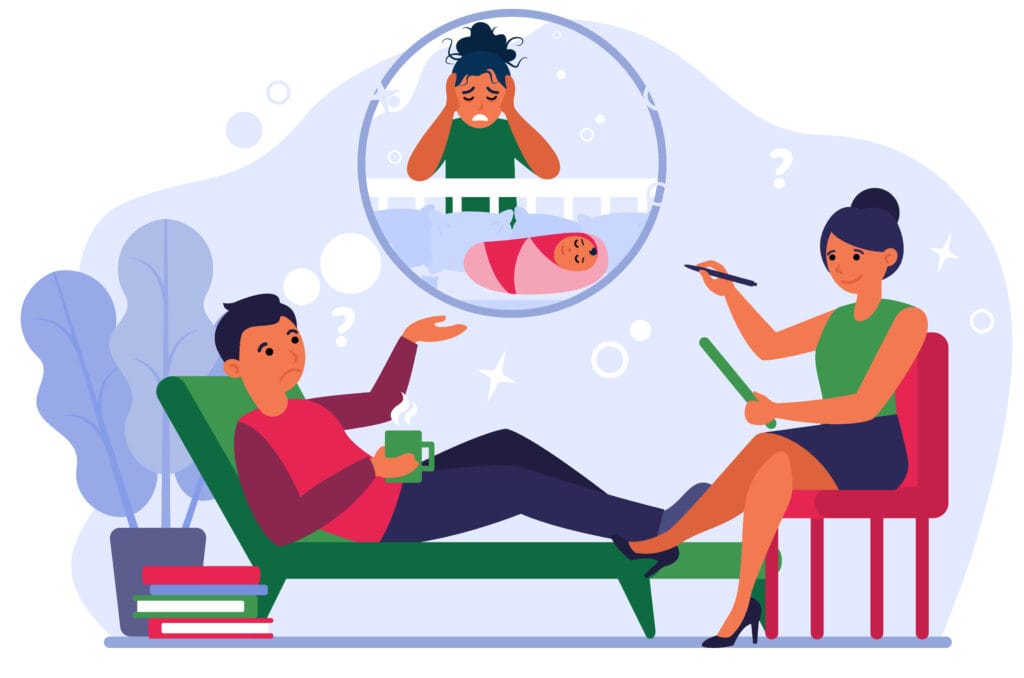
What is Postpartum Depression?
Postpartum Depression (PPD) is a mood disorder that affects parents, primarily mothers, after childbirth. Symptoms typically appear within the first few weeks to months post-delivery but can develop up to a year after giving birth. Early recognition and treatment are essential for maternal mental health and overall well-being.
Symptoms of Postpartum Depression
PPD manifests through a range of emotional, cognitive, and physical symptoms, including:
- Emotional Symptoms: Persistent sadness, mood swings, guilt, irritability, and hopelessness.
- Cognitive Issues: Difficulty concentrating, intrusive thoughts, and decision-making struggles.
- Physical Signs: Fatigue, sleep disturbances, appetite changes, and low energy levels.
Causes & Risk Factors of Postpartum Depression
Several factors can contribute to the onset of postpartum depression, including:
- Hormonal Changes: A sharp drop in estrogen and progesterone levels after childbirth.
- Personal or Family History: Previous depression, anxiety, or mood disorders.
- Stressful Life Events: Financial strain, relationship conflicts, or lack of social support.
- Pregnancy & Childbirth Complications: Difficult labor, premature birth, or health issues in the baby.
Diagnosis: How is Postpartum Depression Identified?
A healthcare professional diagnoses PPD based on a comprehensive evaluation of symptoms, medical history, and standardized screening tools. It is essential to differentiate postpartum depression from the “baby blues,” which are common but temporary mood changes that resolve within a few weeks.
Effective Treatment Options for Postpartum Depression
Managing PPD involves a combination of therapy, medication, and lifestyle modifications:
- Therapy: Cognitive Behavioral Therapy (CBT) and Interpersonal Therapy (IPT) are effective in treating PPD.
- Medication: Antidepressants may be prescribed for moderate to severe cases, ensuring they are safe for breastfeeding mothers.
- Support Groups: Connecting with other parents experiencing postpartum depression can provide emotional relief and guidance.
- Lifestyle Adjustments: Prioritizing sleep, maintaining a balanced diet, regular exercise, and seeking help from family and friends can significantly improve recovery.
Prevention & Management of Postpartum Depression
- Education & Awareness: Expecting parents should be informed about PPD symptoms and risk factors.
- Early Intervention: Prompt medical support can prevent the worsening of symptoms.
- Family Involvement: Partners and family members play a crucial role in emotional and caregiving support.
- Routine Check-Ups: Postpartum healthcare monitoring helps detect and address symptoms early.
Conclusion
Postpartum Depression is a serious but treatable mental health condition affecting new parents. Recognizing the signs, seeking timely intervention, and implementing a structured treatment plan can improve recovery outcomes and ensure the well-being of both parent and child.
📢 Need Help? If you or a loved one is experiencing postpartum depression, reach out to a healthcare professional for guidance and support.
Link to a credible source like the World Health Organization (WHO) or National Institute of Mental Health (NIMH)on postpartum depression. Example: “For more information, visit the World Health Organization’s guide on postpartumdepression.”

